June 1, 2025 | 19:24 GMT +7
June 1, 2025 | 19:24 GMT +7
Hotline: 0913.378.918
June 1, 2025 | 19:24 GMT +7
Hotline: 0913.378.918
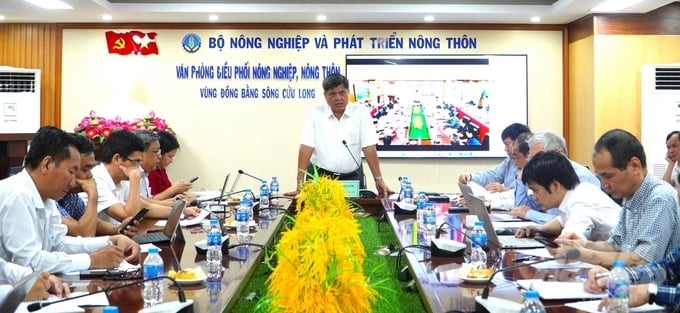
Deputy Minister of Agriculture and Rural Development Tran Thanh Nam chairing a conference to gather feedback on the draft decree regarding the pilot program to transfer carbon credit within the framework of the Project for one million hectares of high-quality rice. Photo: Kim Anh.
Deputy Minister of Agriculture and Rural Development Tran Thanh Nam chaired a conference on May 3 to gather feedback from experts, relevant agencies, and twelve provinces and cities within the Mekong Delta region. Subsequently, the results of the conference will be utilized to finalize the draft decree on a pilot program to transfer carbon credit payment results. The program will be implemented within the framework of the Sustainable Development Project for one million hectares of specialized, low-emission high-quality rice in association with green growth in the Mekong Delta region by 2030
The draft decree was prepared by the Institute of Policy and Strategy for Agriculture and Rural Development. It includes activities directly contributing to greenhouse gas emission reduction, such as implementing sustainable and advanced farming practices; modernizing internal irrigation systems and the management of water resource, seeds, materials, fertilizers, and pesticides in rice production; collecting and processing post-harvest crop residues and straw; and implementing other measures to fulfill green growth criteria.
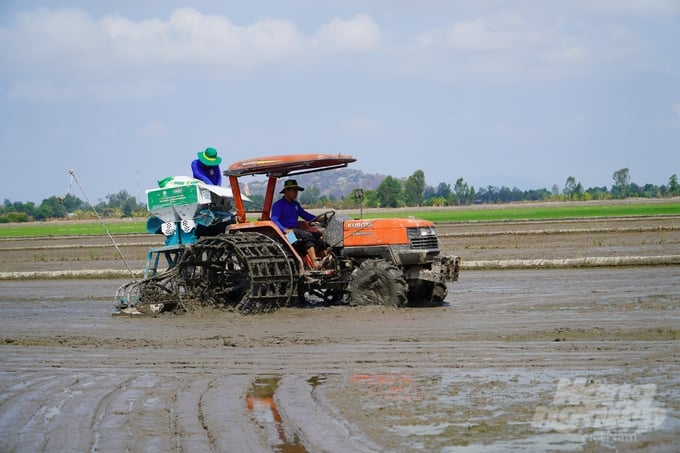
Cooperatives, cooperative groups, and their members are eligible for maximum payment when participating in low emission rice farming within the framework of the Project for one million hectares of high-quality rice. Photo: Kim Anh.
The principle of transfer is determined in accordance with the emission reduction payment agreement under the Transformative Carbon Asset Facility (TCAF). This funding is provided by the World Bank to support the implementation of the Project for one million hectares of high-quality rice. The agreement has been signed between the Ministry of Agriculture and Rural Development and the World Bank.
The primary beneficiaries in the emission reduction transfer process, as suggested by the conference participants, are economic cooperative organizations (cooperatives and cooperative groups) and cooperative members directly involved in low emission rice farming.
Accordingly, cooperatives and cooperative groups will be provided with financial support for various activities, including organizing information dissemination programs and mobilizing farmers to participate in the Project for one million hectares of high-quality rice; conduct training and capacity building on emission reduction farming practices, straw processing management, livelihood diversification, and circular economy development for cooperative members; organizing registration, monitoring, evaluation, and confirmation of emission reduction results; performing technology transfer; and developing partnerships with businesses in low emission rice farming and consumption.
Additionally, the funding will enable economic cooperative organizations to invest in irrigation systems to support low emission rice farming. Notably, cooperative members directly engaged in low emission rice farming will receive a portion of the emission reduction payment.
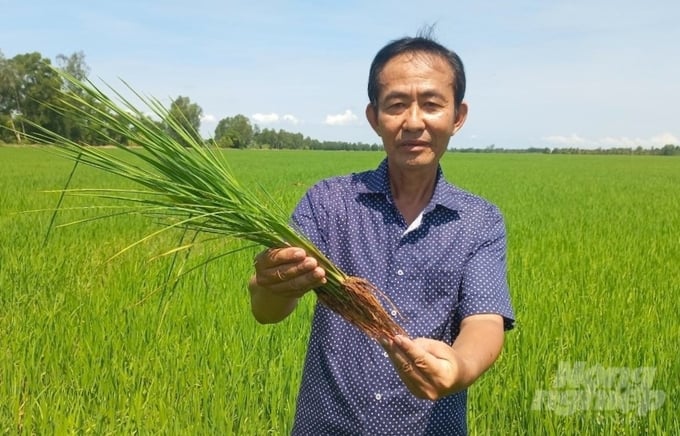
Emission reduction payment will enable farmers to invest in emission reduction farming practices and diversify livelihoods. Photo: Kim Anh.
The funding will be directly allocated to cooperative members based on their contributions to the emission reduction effort, and their area of low emission farming. Moreover, this funding will encourage farmers to invest in production equipment and implement technical measures to reduce emissions.
On the other hand, businesses participating in the Project for one million hectares of high-quality rice will have the opportunity to promote and establish a brand of low emission rice and straw products.
In response to feedback from local governments, experts, and research institutes, Deputy Minister Tran Thanh Nam requested the Institute of Policy and Strategy for Agriculture and Rural Development to promptly adjust and finalize the draft. Subsequently, the Ministry of Agriculture and Rural Development will coordinate with relevant ministries and the World Bank to consolidate the draft's content prior to submission for review by the Prime Minister.
Carbon credits were conceived as a financial incentive to reduce greenhouse gas emissions and promote sustainable development. Accordingly, stakeholders may either purchase carbon credits to offset their greenhouse gas emissions, or sell their generated carbon credits for financial benefits.
The concept of carbon credits was initially introduced in the Kyoto Protocol in 1997 and became effective in 2005. Subsequently, the global carbon credit market has experienced rapid growth, reaching a value of 3 billion USD in 2020.
With the aim of accomplishing its national climate change strategy by 2050 and utilizing the financial advantages of the global carbon credit market to foster sustainable development, Vietnam are making active efforts to establish a national carbon credit market by 2025, and export carbon credits by 2027.
Translated by Nguyen Hai Long
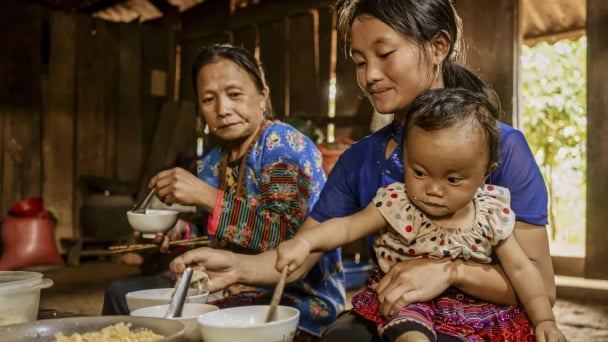
(VAN) 30 experts in health, agriculture and environment participated in a consultation workshop to inform the development of a methodological framework aimed at supporting Vietnam’s transition to a sustainable food system.
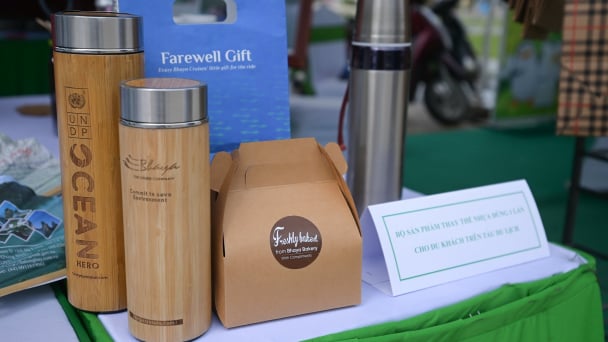
(VAN) Over the past five years, Quang Ninh Province has vigorously and synchronously implemented the ‘Say No to Plastic Waste’ campaign, yielding positive outcomes in advancing sustainable tourism.

(VAN) The prevention of plastic pollution necessitates collaboration among governments, businesses, and citizens. Today's little things contribute to a future free of plastic.

(VAN) This was the directive given by Deputy Minister Phung Duc Tien during a meeting with the Department of Livestock Production and Animal Health, and relevant stakeholders to prevent and control African swine fever.
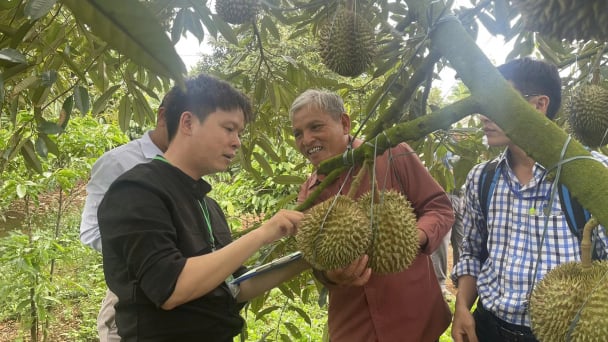
(VAN) For the durian industry to succeed, the value chain must fulfill its commitments to the government, the community, and international partners.

(VAN) Vaccinating juvenile pangasius helps reduce disease, antibiotic use, and farming costs, increasing profits for export-oriented farmers in An Giang.

(VAN) Due to a limited supply of workforce and competitive recruitment requirements, businesses struggle to retain talented veterinary human resources.